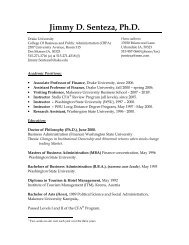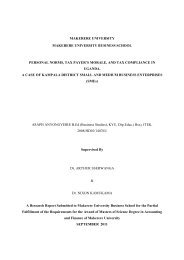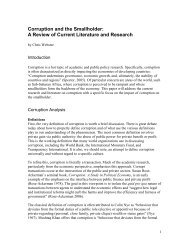13th Annual International Management Conference Proceeding
13th Annual International Management Conference Proceeding
13th Annual International Management Conference Proceeding
Create successful ePaper yourself
Turn your PDF publications into a flip-book with our unique Google optimized e-Paper software.
TOPIC: FOSTERING SOCIAL ENTREPRENEURSHIP IN UGANDA.<br />
BY<br />
TUKAMUSHABA KUROBUZA EDDY<br />
HEAD OF DEPARMENT LEISURE & HOSPITALITY<br />
MAKERERE UNIVERSITY BUSINESS SCHOOL<br />
1.0 Introduction<br />
Social entrepreneurship is a new and rapidly rising field of practice that is, as yet, under-researched in Uganada. Social<br />
entrepreneurship involves innovative approaches to address issues in the domains of education, environment, fair-trade,<br />
health and human rights and is widely regarded as an important building block of the sustainable development of<br />
countries. Social entrepreneurship is likely to become even more important than for-profit entrepreneurship (Gendron<br />
1996)<br />
Social entrepreneurship is the process of founding ventures, both for profit and not-for-profit whose missions focus<br />
on creating positive social change. According to Dees, (1988) the term “social entrepreneurship” involves: adopting a<br />
mission to create and sustain social value; recognizing and relentlessly pursuing new opportunities to serve that<br />
mission; engaging in a process of continuous innovation, adaptation, and learning; acting boldly without being limited<br />
by resources currently in hand; and exhibiting a heightened sense of accountability for the outcomes created.<br />
Social and business entrepreneurs share common traits including an innovative, risk-taking approach to a challenge, the<br />
ability to seize opportunities, transforming “business as usual” and mobilizing scarce resources towards that end. The<br />
economist Joseph Schumpeter called business entrepreneurs the “change agents in the economy”. He wrote that “by<br />
serving new markets or creating new ways of doing things, they move the economy forward”. Social entrepreneurs are<br />
the change agents in the social sector.<br />
However, in contrast to business entrepreneurs, the way to best measure their success is not how much profit they<br />
make, but the extent to which they improve the lives of those they mobilize through their actions. Social entrepreneurs<br />
can set up their initiatives as for-profit or not-for-profit organizations, and that choice will be a function of their<br />
vision and theory of change. Most social enterprises are hybrid organizations. That is to say,<br />
they operate along business lines and may indeed aim to make a profit, but their primary goal is to promote social<br />
change.<br />
In Uganda, most organizations formed with the prime of objective of improving social welfare of the urban and rural<br />
poor end up exploiting the very people they are supposed to help. For example, in a standard micro finance institution<br />
operation, members of a society who can’t access normal financial markets like commercial banks are required to form<br />
groups so that they can be aided through micro-lending program to start small businesses that improve their lot in life.<br />
The loan agreement is organized under group loan arrangement. In order to get a loan, the individual must put up<br />
their reputation as collateral – say five non-family members of the community must vouch for them and being willing<br />
to pay their debt if they default. Under this arrangement, the groups formed are artificial and have no natural<br />
characteristics, which create artificial bonding that does not reflect the benefits of social capital, characterized by<br />
mistrust, sabotage, and lack of disclosure, which eventually leads to failure of enterprises formed (Radio talk show held<br />
on Voice of Kigezi July, 2006).<br />
Although entrepreneurial initiatives aimed at social and economic wealth creation are not new, they only recently raised<br />
increasing interests among scholars (Wallace, 1999). Thus there is still relatively little known about the particular<br />
dynamics and processes involved in Social entrepreneurship.<br />
1.1 Statement of the problem<br />
Social entrepreneurship has raised increasing interest among scholars, yet we still know relatively little about<br />
the particular dynamics and processes involved. Women organizations formed in Kabale district with a<br />
mission to create and sustain social value has continually failed to achieve their goal due poor perceived<br />
desirability and feasibility of businesses formed, lack of cognitive and emotional characteristics, and Social<br />
capital, poor behavioral intentions, leading to failure of Social enterprises formed.<br />
59
















